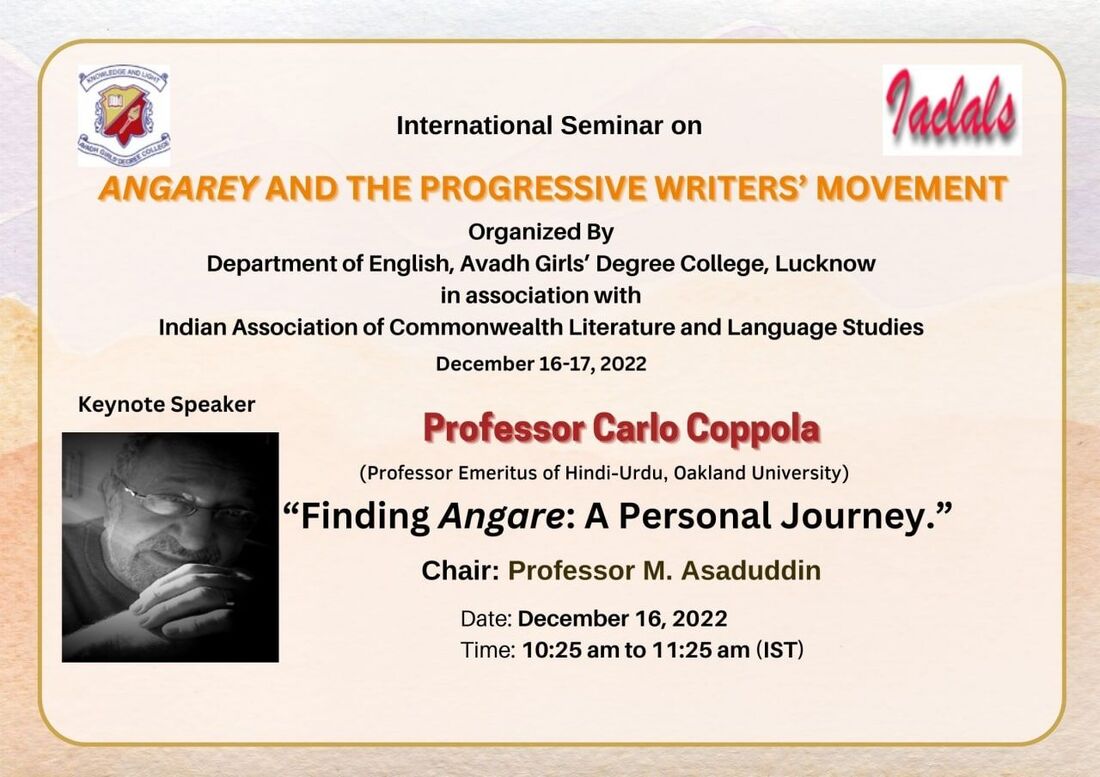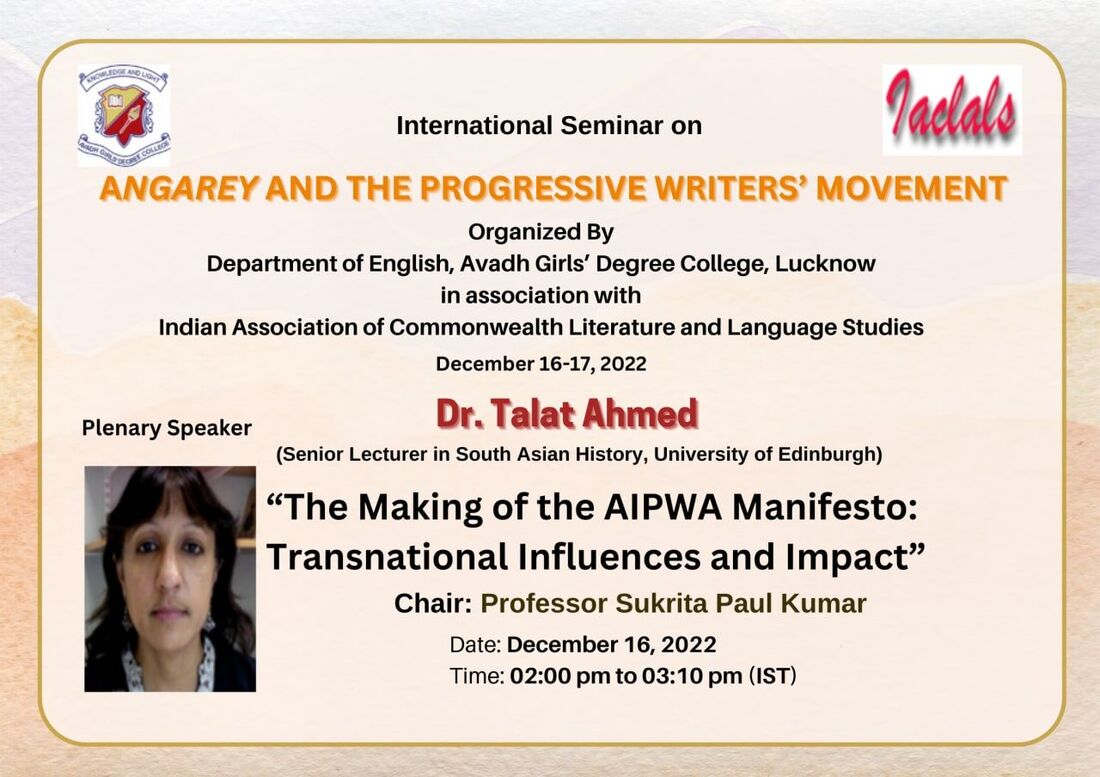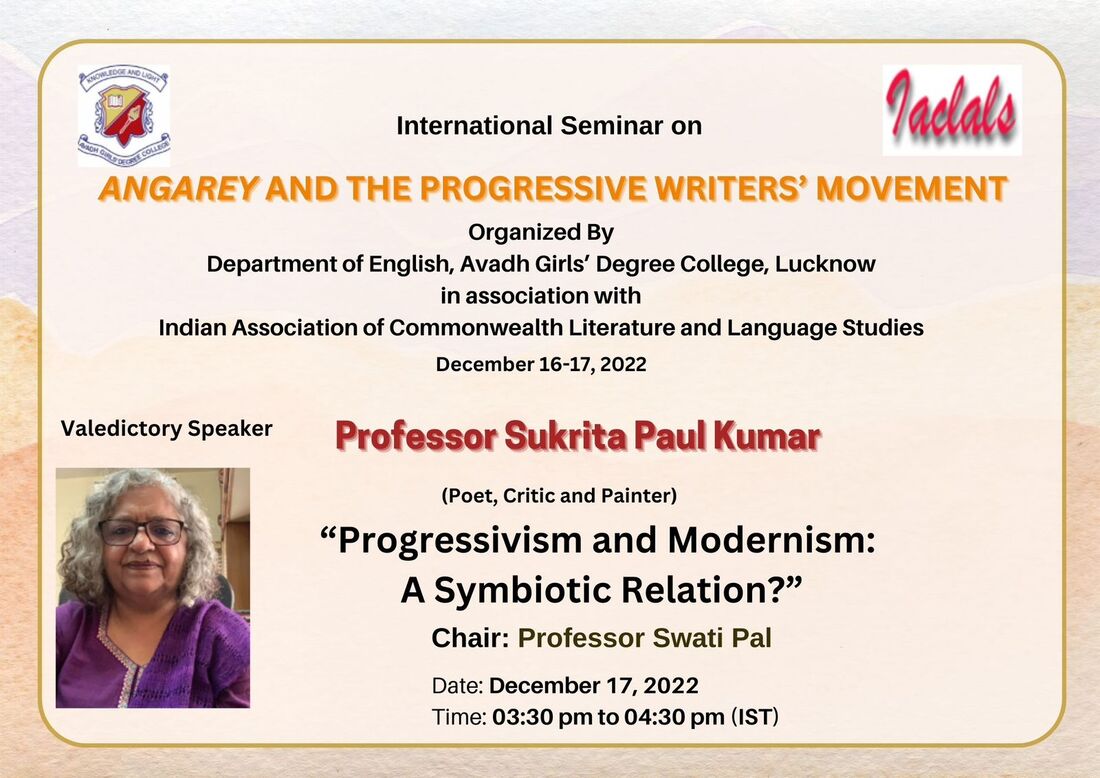INTERNATIONAL SEMINAR
*DEADLINE EXTENDED*
International Seminar on “Angarey and the Progressive Writers’ Movement”
16th – 17th December, 2022
International Seminar on “Angarey and the Progressive Writers’ Movement”
16th – 17th December, 2022
- Interested scholars may mail abstracts (250-300 words) and a bio-note (50-100 words) by 10th November, 2022 to the following email address: [email protected]
- Acceptance will be notified by 15th November, 2022
International Seminar on “Angarey and the Progressive Writers’ Movement”
16th – 17th December, 2022
hosted by
Department of English, Avadh Girls’ Degree College (AGDC), Lucknow
in association with
Indian Association of Commonwealth Literature and Language Studies (IACLALS)
As we enter the ninetieth year of the publication of Angarey (originally published in Urdu), the Department of English, Avadh Girls’ Degree College (AGDC), Lucknow, in association with the Indian Association of Commonwealth Literature and Language Studies (IACLALS) proposes to host a seminar inviting scholarly papers with a view to revisit the collection and the movement it catalyzed. We purport to open up debates on various issues and dynamics of Progressivism and the impact they made on literary genres across Indian languages. Professor Carlo Coppola, formerly of the University of Chicago and an international expert on the Progressive Writers Movement, has agreed to deliver the keynote. Dr. Talat Ahmed, Senior Lecturer, South Asian History, University of Edinburgh will deliver the plenary address.
In 1932, Sajjad Zaheer (1905–1973) edited and brought out a collaborative anthology Angarey (live coals) comprising nine short stories and a drama in Urdu. All the writers either belonged to Lucknow or were associated with educational institutions over here. Angarey included five of Zaheer’s stories; Ahmed Ali (1910–94) contributed two; Mahmud-uz-Zafar (1908–56) contributed one, and Rashid Jahan (1905–52) contributed a play and a story. The book was meant to be a reaction against the lassitude of Muslim society and the literature it consumed and aimed to shake the Muslim intelligentsia out of its complacency. Angarey created an uproar. It was criticized severely for being sacrilegious and profane; large scale protests were held against it. The writers were condemned by conservative sections of the society and threatened with dire consequences. Rashid Jahan, the only woman contributor and a medical doctor by profession, was threatened with, among other things, having her nose cut off. The British Government of the United Provinces responded by proscribing and confiscating published issues of the book. The publication of Angarey indicated the presence of a generation of writers who challenged orthodoxy, supported socialism and the nationalist cause. The tone, subject and ambience of their stories were modern and realistic. Contrary views exist as regards the literary merits of Angarey. In retrospect, both Sajjad Zaheer and Ahmad Ali conceded that the stories were adolescent, reactionary and contained a good deal of anger against obsolete and retrogressive values. Despite the allegations leveled against the contributors and the collection, Angarey remains an introspective, emancipatory project of radical thinkers. It contributed a tendency that aimed at an authentic, realistic representation of social and cultural life in Urdu fiction. It brought the Urdu story out of the realms of romanticism and didacticism and converted it into a sociological and experimental activity. It presented the complexities and turmoil of contemporary life and provided the necessary impetus for it to come of age.
Shortly after the publication of Angarey, Ahmed Ali and Mahmud-uz-Zafar announced the formation of the “League of Progressive Authors.” In 1936, the League was expanded to form the All-India Progressive Writers’ Association. Sajjad Zaheer’s qasi historical account of the All India Progressive Writers’ Movement (AIPWM) Roshnai gives that the Association was conceived and initiated in London in 1935 by him and likeminded associates, with assistance from Ralph Fox. On his return to India, Sajjad Zaheer, was supported by forward thinking, progressive writers like Premchand, Maulvi Abdul Haq and Josh Malihabadi in actively promoting the Progressive cause. At its onset, the Movement intended to spearhead change in literary subject, tone and style; its guiding principles were based in socialism and realism. The All India Progressive Writers’ Association (AIPWA) was formally launched in1936, at the Rifah-e Aam Club, Lucknow. Premchand was the first president. A carefully prepared manifesto (known as the Lucknow Manifesto) outlined that literature should voice the radical changes taking place in Indian society; foster progress and discourage communalism, and exploitation. Literature and art became vital organs articulating the actualities of life; local organizations that promoted co-operation and interaction among regional writers were instituted; conferences and meetings were held regularly; Progressive literature was produced and translated into multiple regional languages; freedom of expression, thought, and opinion was protected. It may be conceded that Angarey brought together a group of writers who became directly responsible for the creation of the most influential and powerful literary-political organization in the subcontinent.
The AIPWM began as a bourgeois enterprise aimed at the uplift of the underprivileged. It propelled social realism, psychological realism, feminism, anti-colonial sentiment, and foregrounded the political struggle for freedom and expressed anger and anxiety over the socio-economic conditions of the masses, all of which affected millions of Indians. Central to the Progressive spirit was the writer’s concern with man in particular and mankind in general. The movement precipitated abiding, fundamental changes and ensured representation of peoples’ dilemmas. The Association ensured a platform for the concerns of the masses and became a watershed for women writers to express themselves freely.
Once it had permeated Urdu literature, the movement soon made inroads into Hindi and most Indian languages, including Punjabi, Marathi, Gujarati, Odia, Malayalam and Bengali, bringing about an innovative creative upsurge across the country. A large number of critics, writers, poets and dramatists including Khalil-ur-Rahman Azmi, Muhammad Hasan Askari, Firaq Gorakhpuri, Prabhakar Machwe,Sudhi Pradhan, Jyotirmoy Ghosh, Faiz Ahmed Faiz, Ismat Chughtai, Sa’adat Hasan Manto, Krishan Chander, Rajinder Singh Bedi, Asrar-ul-Haq Majaz, Josh Malihabadi, Sahir Ludhianvi, Khwaja Ahmad Abbas, Razzia Sajjad Zaheer, Rameshwar Shukla, Nagarjun, Vijaydan Detha, Yashpal, Vinda Karandikar, Narayan Surve, Sant Singh Sekhon, Jhaverchand Meghani, Umashankar Joshi, Khadija Mastur, Ahmad Nadeem Qasmi and Hajira Masroor, spearheaded the movement and/or lent active support.
Scholars are invited to present papers, on any of the broad themes listed below or on any of the writers mentioned above and their relationship with the PWM. Papers on individual texts and their relationship with Angarey are also welcome.
Important Dates:
Please Note:
Our Host:
Avadh Girls’ Degree College is a higher education institution for women. Founded in 1958 as Loreto Degree College, it was taken over from Loreto Convent by the Government and handed to the Avadh Educational Society in 1975. The college flourishes under the able leadership of its Managing Committee, Principal and dedicated Faculty. Affiliated with the University of Lucknow, it is a leading institution, imparting value based education. AGDC runs Arts and Commerce faculties and a Master’s programme in English. It inculcates academic excellence and lays equal emphasis on extra-curricular activities. It organizes several functions through various clubs. Students are given ample opportunity to showcase and develop their talents. It is a matter of great pride that many of the women educated at AGDC have carved out a niche for themselves in the Indian Administrative and Allied Services, Banking, Chartered accountancy, Defence and several top Managerial positions. We at Avadh Girls’ Degree College, Lucknow, look forward to hosting the “Angarey and the Progressive Writers’ Movement” seminar.
Host Committee:
Patron:
16th – 17th December, 2022
hosted by
Department of English, Avadh Girls’ Degree College (AGDC), Lucknow
in association with
Indian Association of Commonwealth Literature and Language Studies (IACLALS)
As we enter the ninetieth year of the publication of Angarey (originally published in Urdu), the Department of English, Avadh Girls’ Degree College (AGDC), Lucknow, in association with the Indian Association of Commonwealth Literature and Language Studies (IACLALS) proposes to host a seminar inviting scholarly papers with a view to revisit the collection and the movement it catalyzed. We purport to open up debates on various issues and dynamics of Progressivism and the impact they made on literary genres across Indian languages. Professor Carlo Coppola, formerly of the University of Chicago and an international expert on the Progressive Writers Movement, has agreed to deliver the keynote. Dr. Talat Ahmed, Senior Lecturer, South Asian History, University of Edinburgh will deliver the plenary address.
In 1932, Sajjad Zaheer (1905–1973) edited and brought out a collaborative anthology Angarey (live coals) comprising nine short stories and a drama in Urdu. All the writers either belonged to Lucknow or were associated with educational institutions over here. Angarey included five of Zaheer’s stories; Ahmed Ali (1910–94) contributed two; Mahmud-uz-Zafar (1908–56) contributed one, and Rashid Jahan (1905–52) contributed a play and a story. The book was meant to be a reaction against the lassitude of Muslim society and the literature it consumed and aimed to shake the Muslim intelligentsia out of its complacency. Angarey created an uproar. It was criticized severely for being sacrilegious and profane; large scale protests were held against it. The writers were condemned by conservative sections of the society and threatened with dire consequences. Rashid Jahan, the only woman contributor and a medical doctor by profession, was threatened with, among other things, having her nose cut off. The British Government of the United Provinces responded by proscribing and confiscating published issues of the book. The publication of Angarey indicated the presence of a generation of writers who challenged orthodoxy, supported socialism and the nationalist cause. The tone, subject and ambience of their stories were modern and realistic. Contrary views exist as regards the literary merits of Angarey. In retrospect, both Sajjad Zaheer and Ahmad Ali conceded that the stories were adolescent, reactionary and contained a good deal of anger against obsolete and retrogressive values. Despite the allegations leveled against the contributors and the collection, Angarey remains an introspective, emancipatory project of radical thinkers. It contributed a tendency that aimed at an authentic, realistic representation of social and cultural life in Urdu fiction. It brought the Urdu story out of the realms of romanticism and didacticism and converted it into a sociological and experimental activity. It presented the complexities and turmoil of contemporary life and provided the necessary impetus for it to come of age.
Shortly after the publication of Angarey, Ahmed Ali and Mahmud-uz-Zafar announced the formation of the “League of Progressive Authors.” In 1936, the League was expanded to form the All-India Progressive Writers’ Association. Sajjad Zaheer’s qasi historical account of the All India Progressive Writers’ Movement (AIPWM) Roshnai gives that the Association was conceived and initiated in London in 1935 by him and likeminded associates, with assistance from Ralph Fox. On his return to India, Sajjad Zaheer, was supported by forward thinking, progressive writers like Premchand, Maulvi Abdul Haq and Josh Malihabadi in actively promoting the Progressive cause. At its onset, the Movement intended to spearhead change in literary subject, tone and style; its guiding principles were based in socialism and realism. The All India Progressive Writers’ Association (AIPWA) was formally launched in1936, at the Rifah-e Aam Club, Lucknow. Premchand was the first president. A carefully prepared manifesto (known as the Lucknow Manifesto) outlined that literature should voice the radical changes taking place in Indian society; foster progress and discourage communalism, and exploitation. Literature and art became vital organs articulating the actualities of life; local organizations that promoted co-operation and interaction among regional writers were instituted; conferences and meetings were held regularly; Progressive literature was produced and translated into multiple regional languages; freedom of expression, thought, and opinion was protected. It may be conceded that Angarey brought together a group of writers who became directly responsible for the creation of the most influential and powerful literary-political organization in the subcontinent.
The AIPWM began as a bourgeois enterprise aimed at the uplift of the underprivileged. It propelled social realism, psychological realism, feminism, anti-colonial sentiment, and foregrounded the political struggle for freedom and expressed anger and anxiety over the socio-economic conditions of the masses, all of which affected millions of Indians. Central to the Progressive spirit was the writer’s concern with man in particular and mankind in general. The movement precipitated abiding, fundamental changes and ensured representation of peoples’ dilemmas. The Association ensured a platform for the concerns of the masses and became a watershed for women writers to express themselves freely.
Once it had permeated Urdu literature, the movement soon made inroads into Hindi and most Indian languages, including Punjabi, Marathi, Gujarati, Odia, Malayalam and Bengali, bringing about an innovative creative upsurge across the country. A large number of critics, writers, poets and dramatists including Khalil-ur-Rahman Azmi, Muhammad Hasan Askari, Firaq Gorakhpuri, Prabhakar Machwe,Sudhi Pradhan, Jyotirmoy Ghosh, Faiz Ahmed Faiz, Ismat Chughtai, Sa’adat Hasan Manto, Krishan Chander, Rajinder Singh Bedi, Asrar-ul-Haq Majaz, Josh Malihabadi, Sahir Ludhianvi, Khwaja Ahmad Abbas, Razzia Sajjad Zaheer, Rameshwar Shukla, Nagarjun, Vijaydan Detha, Yashpal, Vinda Karandikar, Narayan Surve, Sant Singh Sekhon, Jhaverchand Meghani, Umashankar Joshi, Khadija Mastur, Ahmad Nadeem Qasmi and Hajira Masroor, spearheaded the movement and/or lent active support.
Scholars are invited to present papers, on any of the broad themes listed below or on any of the writers mentioned above and their relationship with the PWM. Papers on individual texts and their relationship with Angarey are also welcome.
- Society, politics, culture and Angarey
- Angarey as the precursor of the Progressive writers’ Movement
- Overseas influences and the AIPWA Manifesto
- Radicalization of Literature under the PWM
- Anti-colonial sentiment and the Progressive Writers
- Psychological realism and Progressive literature
- Humanism and Progressive literature
- Modernism and Progressive ideals
- Feminism and Progressive ideals
- Progressive ideals and cinema
- Art and Activism
- Progressive ideals and literature today
Important Dates:
- Interested scholars may mail abstracts by 31st October, 2022 to the following email address: [email protected]
- Acceptance will be notified by 5thNovember, 2022
- Registration fees: INR 1500/- for research scholars and INR 2000/- for all delegates, to be submitted by 5th December, 2022 by means of NEFT
- Complete papers may be submitted by 10th December, 2022
- Registration details will be shared along with the acceptance of abstracts.
Please Note:
- Only overseas participants can join online on request, without payment of registration fee
- All invited speakers’ sessions and business sessions will be held at the venue
- Outstation participants will bear their own travel expenses
- Participants will make their own arrangements for stay in Lucknow.
- AGDC will share details of available options along with registration details.
Our Host:
Avadh Girls’ Degree College is a higher education institution for women. Founded in 1958 as Loreto Degree College, it was taken over from Loreto Convent by the Government and handed to the Avadh Educational Society in 1975. The college flourishes under the able leadership of its Managing Committee, Principal and dedicated Faculty. Affiliated with the University of Lucknow, it is a leading institution, imparting value based education. AGDC runs Arts and Commerce faculties and a Master’s programme in English. It inculcates academic excellence and lays equal emphasis on extra-curricular activities. It organizes several functions through various clubs. Students are given ample opportunity to showcase and develop their talents. It is a matter of great pride that many of the women educated at AGDC have carved out a niche for themselves in the Indian Administrative and Allied Services, Banking, Chartered accountancy, Defence and several top Managerial positions. We at Avadh Girls’ Degree College, Lucknow, look forward to hosting the “Angarey and the Progressive Writers’ Movement” seminar.
Host Committee:
- Dr. Ansh Sharma ([email protected] )
- Dr. Devanshi Bhatnagar ([email protected] )
- Dr. Almee Raza ([email protected])
Patron:
- Miss Zarine Viccajee; President, Avadh Girls’ Degree College, Lucknow
- Professor Nishi Pandey; Professor of Eminence, Department of English and Modern European Languages, University of Lucknow, Lucknow; & Manager/Secretary, Avadh Educational Society and Avadh Girls’ Degree College, Lucknow
- Professor Bina Rai, Principal, Avadh Girls’ Degree College, Lucknow
- Professor Fatima Rizvi, Department of English and Modern European Languages, University of Lucknow, Lucknow ([email protected]) Treasurer: Professor Ranjana Krishna, Professor, Department of English, Avadh Girls’ Degree College, Lucknow ( [email protected] )
- Professor M. Asaduddin, Dean Faculty of Humanities and Languages, Professor, Department of English, Faculty of Humanities and Languages, Jamia Millia Islamia University, New Delhi; Chairperson, IACLALS
- Professor Madhu Singh, Department of English and Modern European Languages, University of Lucknow, Lucknow Professor Meenakshi Pawha, Department of English and Modern European Languages, University of Lucknow, Lucknow
- Professor Swati Pal, Principal, Janki Devi Memorial College, University of Delhi, New Delhi; Vice Chair, IACLALS
- Professor Ranjana Krishna, Professor, Department of English, Avadh Girls’ Degree College, Lucknow
- Ms. Kalyanee Rajan, Assistant Professor, Department of English, Shaheed Bhagat Singh Evening College, University of Delhi, New Delhi; Treasurer, IACLALS



